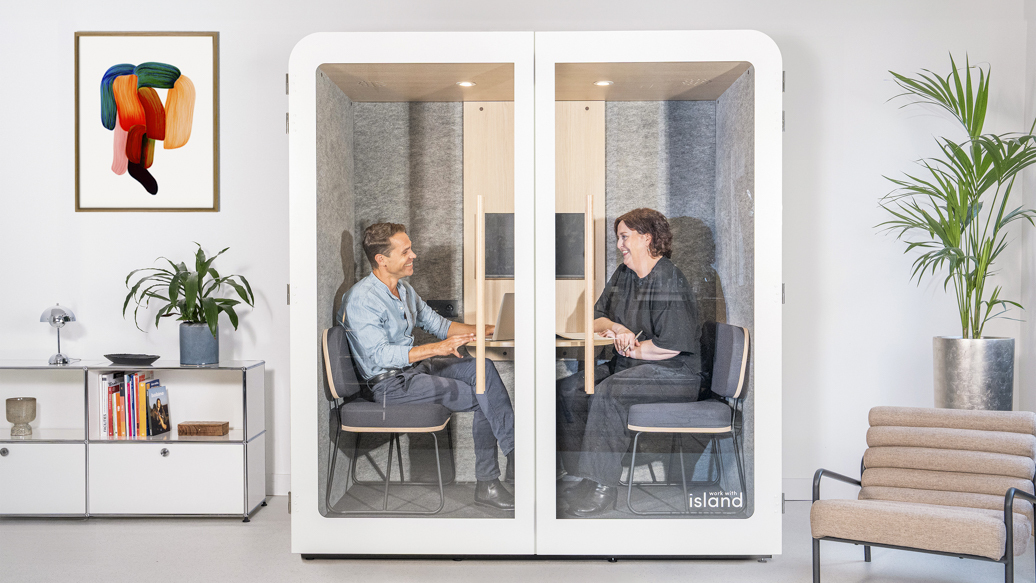

Work With Island

1.6
Île-de-France, France
July 2025
Furniture
Wholesale/Retail
Belgium,
France,
Italy,
Luxembourg,
Netherlands The,
Spain,
Switzerland,
United Kingdom
Depuis 2018, Work With Island développe des cabines acoustiques pour repenser la manière dont nous travaillons ensemble. L’entreprise est née d’un constat simple : dans les open spaces et espaces partagés, malgré la présence de salles de réunion, il manque souvent des lieux pour s’isoler, se concentrer ou collaborer en petit comité. La mission de Work With Island est claire : ramener du calme dans les bureaux, pour les employés comme pour les managers, et redonner à chacun la possibilité de travailler dans de bonnes conditions. Fabriquées en France à partir de matériaux recyclés et recyclables, les cabines Work With Island sont pensées pour durer : démontables, réutilisables et faciles à réparer. Leur design volontairement épuré permet d’accompagner naturellement l’évolution des espaces de travail, sans gaspillage ni surconsommation. Work With Island sur la transparence et la simplicité : prix affichés, commande en ligne, livraison rapide et période d’essai de 100 jours. Cette approche reflète une conviction forte : l’aménagement des bureaux doit être durable, responsable et équitable. Aujourd’hui, l’entreprise accompagne tous les types d'organisations - des PME aux grands groupes - qui souhaitent allier performance, bien-être et responsabilité.
Overall B Impact Score
Governance 15.8
Governance evaluates a company's overall mission, engagement around its social/environmental impact, ethics, and transparency. This section also evaluates the ability of a company to protect their mission and formally consider stakeholders in decision making through their corporate structure (e.g. benefit corporation) or corporate governing documents.
What is this? A company with an Impact Business Model is intentionally designed to create a specific positive outcome for one of its stakeholders - such as workers, community, environment, or customers.
Workers 29.1
Workers evaluates a company’s contributions to its employees’ financial security, health & safety, wellness, career development, and engagement & satisfaction. In addition, this section recognizes business models designed to benefit workers, such as companies that are at least 40% owned by non-executive employees and those that have workforce development programs to support individuals with barriers to employment.
Community 18.8
Community evaluates a company’s engagement with and impact on the communities in which it operates, hires from, and sources from. Topics include diversity, equity & inclusion, economic impact, civic engagement, charitable giving, and supply chain management. In addition, this section recognizes business models that are designed to address specific community-oriented problems, such as poverty alleviation through fair trade sourcing or distribution via microenterprises, producer cooperative models, locally focused economic development, and formal charitable giving commitments.
Environment 39.9
Environment evaluates a company’s overall environmental management practices as well as its impact on the air, climate, water, land, and biodiversity. This includes the direct impact of a company’s operations and, when applicable its supply chain and distribution channels. This section also recognizes companies with environmentally innovative production processes and those that sell products or services that have a positive environmental impact. Some examples might include products and services that create renewable energy, reduce consumption or waste, conserve land or wildlife, provide less toxic alternatives to the market, or educate people about environmental problems.
What is this? A company with an Impact Business Model is intentionally designed to create a specific positive outcome for one of its stakeholders - such as workers, community, environment, or customers.
Customers 3.5
Customers evaluates a company’s stewardship of its customers through the quality of its products and services, ethical marketing, data privacy and security, and feedback channels. In addition, this section recognizes products or services that are designed to address a particular social problem for or through its customers, such as health or educational products, arts & media products, serving underserved customers/clients, and services that improve the social impact of other businesses or organizations.